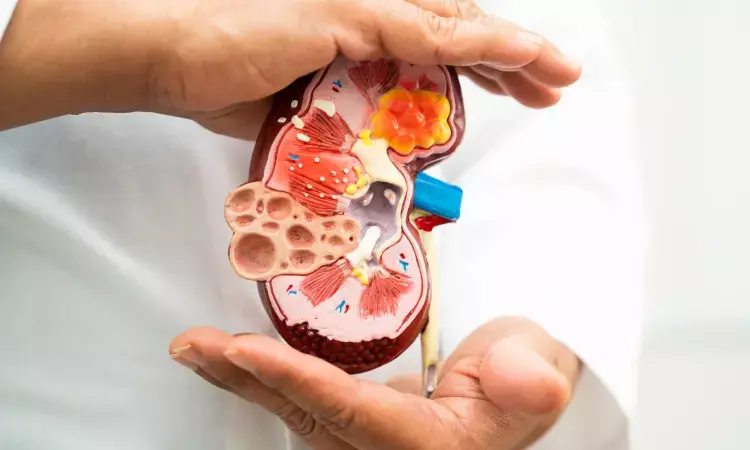- Home
- Medical news & Guidelines
- Anesthesiology
- Cardiology and CTVS
- Critical Care
- Dentistry
- Dermatology
- Diabetes and Endocrinology
- ENT
- Gastroenterology
- Medicine
- Nephrology
- Neurology
- Obstretics-Gynaecology
- Oncology
- Ophthalmology
- Orthopaedics
- Pediatrics-Neonatology
- Psychiatry
- Pulmonology
- Radiology
- Surgery
- Urology
- Laboratory Medicine
- Diet
- Nursing
- Paramedical
- Physiotherapy
- Health news
- Fact Check
- Bone Health Fact Check
- Brain Health Fact Check
- Cancer Related Fact Check
- Child Care Fact Check
- Dental and oral health fact check
- Diabetes and metabolic health fact check
- Diet and Nutrition Fact Check
- Eye and ENT Care Fact Check
- Fitness fact check
- Gut health fact check
- Heart health fact check
- Kidney health fact check
- Medical education fact check
- Men's health fact check
- Respiratory fact check
- Skin and hair care fact check
- Vaccine and Immunization fact check
- Women's health fact check
- AYUSH
- State News
- Andaman and Nicobar Islands
- Andhra Pradesh
- Arunachal Pradesh
- Assam
- Bihar
- Chandigarh
- Chattisgarh
- Dadra and Nagar Haveli
- Daman and Diu
- Delhi
- Goa
- Gujarat
- Haryana
- Himachal Pradesh
- Jammu & Kashmir
- Jharkhand
- Karnataka
- Kerala
- Ladakh
- Lakshadweep
- Madhya Pradesh
- Maharashtra
- Manipur
- Meghalaya
- Mizoram
- Nagaland
- Odisha
- Puducherry
- Punjab
- Rajasthan
- Sikkim
- Tamil Nadu
- Telangana
- Tripura
- Uttar Pradesh
- Uttrakhand
- West Bengal
- Medical Education
- Industry
Finerenone and dapagliflozin combo significantly reduced albuminuria in non-diabetic CKD patients: Study

The effectiveness of dapagliflozin and finerenone in reducing albuminuria and slowing the progression of chronic kidney disease (CKD) has been established, but their additive effects have yet to be studied.
According to a study published in the Clinical Kidney Journal, Combining finerenone and dapagliflozin reduced albuminuria safely. Their combined effect was at least equal to each drug's effect alone, suggesting an additive effect.
The present study aimed to compare these two medications' individual and combined efficacy and safety in patients with non-diabetic CKD.
In a randomized, open-label clinical trial, researchers enrolled patients aged 18-80. These patients were on the maximum tolerated dose of an ACE inhibitor or angiotensin receptor blocker and had an eGFR of 25-45 mL/min/1,73 m[2] and albuminuria ranging from 150-2000 mg/g. The participants were assigned to receive either finerenone 20 mg/day or dapagliflozin 10 mg/day for a duration of four weeks, followed by a combination therapy for four weeks. Data were collected at the beginning of the study and weeks 4 and 8.
Key results from the study are:
· Twenty patients (10 in each group) were included in this study.
· These patients had a mean mgfr of 34 ml/min/1,73 m[2] and a mean urine albumin creatinine ratio (UACR) of 469 mg/g.
· Patients receiving finerenone alone or in combination with dapagliflozin experienced a -24% and -34% change in UACR, respectively
· Patients taking dapagliflozin alone or combined with finerenone experienced a -8% and -10% uacr change, respectively.
· Uacr change was -36% after eight weeks. Additionally, systolic blood pressure and mGFR decreased by 10 mmHg and 7 ml/min/1,73 m[2].
· Adverse effects were minimal
The administration of finerenone and dapagliflozin was found to be safe and resulted in a marked reduction in albuminuria in this study. The efficacy of combination therapy was comparable to the combined effects of each drug, suggesting an additive impact on albuminuria. More extensive research is necessary to evaluate this approach's long-term benefits and safety.
Reference:
Mårup, Frederik Husum, et al. "Additive Effects of Dapagliflozin and Finerenone On Albuminuria in Non-diabetic CKD: an Open-label Randomized Clinical Trial." Clinical Kidney Journal, vol. 17, no. 1, 2024, pp. sfad249.
BDS, MDS in Periodontics and Implantology
Dr. Aditi Yadav is a BDS, MDS in Periodontics and Implantology. She has a clinical experience of 5 years as a laser dental surgeon. She also has a Diploma in clinical research and pharmacovigilance and is a Certified data scientist. She is currently working as a content developer in e-health services. Dr. Yadav has a keen interest in Medical Journalism and is actively involved in Medical Research writing.
Dr Kamal Kant Kohli-MBBS, DTCD- a chest specialist with more than 30 years of practice and a flair for writing clinical articles, Dr Kamal Kant Kohli joined Medical Dialogues as a Chief Editor of Medical News. Besides writing articles, as an editor, he proofreads and verifies all the medical content published on Medical Dialogues including those coming from journals, studies,medical conferences,guidelines etc. Email: drkohli@medicaldialogues.in. Contact no. 011-43720751


